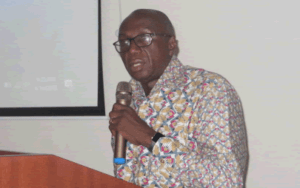National Committee to develop comprehensive framework on national earthquake inaugurated

The National Committee to develop a comprehensive framework for refocusing national earthquake preparedness and response has been inaugurated by Mr Ambrose Dery, Minister for the Interior.
The Committee, which is under the Chairmanship of Mrs Carlien Bou-Chedid of the Ghana Institute of Engineers, is to submit its reports by 15th April, 2019.
The terms of reference of the Committee includes identifying and outlining the key measures that must be undertaken by relevant Agencies to empower communities to be well prepared and resilient for reduction of seismic risk.
It must outline other response required by stakeholders/ agencies in the event of an earthquake, to include the recovery.
It must evaluate capacities of relevant bodies mandated with national response to identify resource gaps and recommend measures to augment their capabilities towards effective response and determined kind of International support that be required.
Other members of the 10-member Committee are Mr Eric Nana Agyemang-Prempeh, Director-General, National Disaster Management Organisation (NADMO); Mr Joseph Ankrah, Chief Disaster Control Officer, NADMO; Mr Nicholas Opoku, a seismologist at the Ghana Geological Survey Authority and Assistant Commissioner of Police (ACP) George Tweneboah of the Ghana Police Service.
The rest are Mr Julius Kuunor, Ghana National Fire Service; Mr Benedict Arhjust, Land Use and Spatial Planning Authority; Dr Lawrence Ofori-Boadu, Ghana Health Service, Professor Ahmed Nuhu Zakariah, Chief Executive Officer, Ghana Ambulance Service; and Colonel M. Mustapha, Ghana Armed Forces.
Mr Dery recounted that over the past year, Ghana, particularly the environs of Accra had hit by a series of earth tremors of magnitudes ranging between 2.6 and 3.9 with the last occurrence on 2nd March.
He said these occurrences were quite worrying because “experts say that such tremors may be warning signal to major earthquake event”.
He said the last destructive earthquake that affected Ghana was on 22nd June 1939 at 1900 hours.
Mr Dery noted that in 1862 an earthquake shook Accra, Christiansburg Castle and all other forts in Accra were rendered uninhabitable.
He explained that, should a major earthquake occur today, there would be many unanswered questions.
He said President Nana Addo Danquah Akufo-Addo in consonance, with his commitment to make each person in Ghana feel safe and secure is justifiably concerned about the state of affairs.
He noted that accordingly, the President had directed that a Committee, be constituted to address the situation.
Mr Dery said the NADMO had several engagements with stakeholders to discuss existing national capacities and capabilities to respond to a major earthquake.
He cited the engagement culminated in a full-scale simulation exercise on 7th to the 10th May 2018 with support from the Government of the United State through the North Dakota National Guard to test the coordination system of NADMO and capabilities of first responders in an event of an earthquake.
Mr Dery urged the members of the Committee to perform the task given them with all diligence and professionalism.
Mrs Bou-Chedid on behalf of her colleagues thanked the President for the trust that he had imposed in them.
She said earthquakes could have very devastating consequences on communities in which they occur; stating that “in fact, they can set back your economic development by many years”.
She said it was essentially important that Ghana takes measures to minimize the risk of the earthquake.
She said it was possible to minimize the risk; adding that, minimizing the risk depended on knowledge of the threat, knowledge of vulnerability and the level of preparedness.
Present at the ceremony were Mr Henry Quartey, Deputy Interior Minister, Mr James Oppong-Boanuh, Deputy Inspector General of Police (IGP), and Mrs Adelaide Anno-Kumi, the Chief Director, Ministry for the Interior.
Source: GNA
